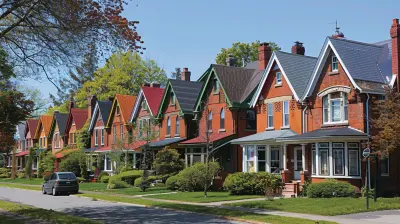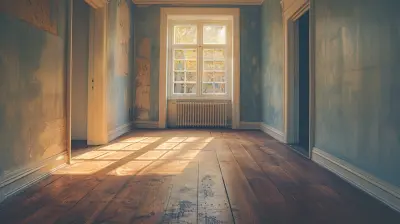Is a Historic Home Right for You? Ask These Key Questions First
18 September 2025
Owning a historic home sounds like a dream come true, doesn’t it? From ornate woodwork to intricate stained glass windows, these old gems offer more than just a place to live—they’re dripping with charm, character, and stories of the past. But before you start packing up modern furniture and signing off on that mortgage, stop right there. Buying a historic home isn’t just a financial commitment; it’s a lifestyle. These homes can be equal parts delightful and demanding. So, how do you know if a historic home is right for you? Ask yourself these key questions first. 
What’s Really Attracting You to a Historic Home?
Let’s start here. Why does the idea of owning a historic home light you up inside? Is it the aesthetic appeal—the craftsmanship and unique details you just don’t see in cookie-cutter modern houses? Maybe it’s the nostalgia, imagining yourself living in a place steeped in history. Or perhaps it's about being part of preserving something truly unique.Be honest with yourself. If you’re drawn purely by the romanticized version of historic homes, you might be in for a surprise. While they’re undeniably beautiful, they come with quirks: creaky floorboards, drafty windows, or rooms configured in ways that might make you scratch your head. Make sure you’re in it for the right reasons, not just the Instagram-worthy shots.
Are You Ready for the Maintenance?
Let’s talk maintenance—because, oh boy, there’s plenty of it. Historic homes often come with a to-do list the size of a novel. The pipes? They might be older than your grandparents. The roof? It probably needs constant love and attention. And if your dream is to keep everything “original,” expect to spend plenty of time (and money) hunting down historically accurate materials and skilled craftsmen to get the job done.Think about it: Are you the type who loves tinkering with projects, or do you prefer the “set it and forget it” convenience of newer homes? If the thought of constantly upgrading, repairing, and restoring doesn’t sound like your cup of tea, this might not be the lifestyle for you. 
Can You Afford It?
Speaking of money—let’s get real. Owning a historic home can be pricey. Sure, the purchase price might look reasonable, but that’s just the tip of the iceberg. Repairs, specialized materials, and ongoing upkeep can add up fast. Not to mention, some homes may fall under regulations from historic preservation societies, meaning you can’t just waltz in and slap on a new coat of paint. Nope, you’ll need to follow specific guidelines, and that can get expensive.Before jumping in, sit down with a financial advisor or real estate expert who has experience with historic properties. Get a clear picture of what you’re getting into. And don’t forget to budget for things like property insurance—because older homes can sometimes be trickier (and pricier) to insure.
How Handy Are You?
Here’s a simple truth: If you own a historic home, you’ll either need to be handy or have a trusted contractor on speed dial. Things will break—sometimes often. And while that’s true for any home, historic homes bring an extra layer of complexity.That squeaky staircase? It’s not just a few loose nails; it could be the entire structure settling over time. The leaky faucet? It might involve plumbing components no longer manufactured. If you’re not comfortable rolling up your sleeves and tackling the occasional (or frequent) project, this could end up being more hassle than happiness.
What Are the Local Historic Preservation Rules?
Before you buy, make sure you understand the specific rules and restrictions that come with owning a historic property in your area. Most historic houses are protected under local, state, or federal preservation laws, which means you may need approval for even minor changes.Want to install vinyl windows for better insulation? Nope, not without proper approval. Thinking of knocking down a wall to open up your kitchen? Forget about it if it alters the historical integrity of the home.
While these rules are essential for maintaining the character of historic neighborhoods, they can feel restrictive if you’re used to having free rein with renovations. Research these guidelines before making any commitments, and be sure you’re comfortable with the level of oversight they bring.
Can You Embrace the Charm and the Flaws?
A historic home isn’t just a property—it’s a personality. These homes have quirks. The kitchen might be small (because, back in the day, cooking wasn’t the social event it is now). Closet space could be laughably small (because people in the 1800s didn’t need walk-in wardrobes). And don’t even get me started on energy efficiency—your heating bill in winter might look like a phone number.The question is: Can you see past the imperfections and embrace them as part of the home’s story? Owning a historic home means accepting its idiosyncrasies as part of its charm. If you’re someone who craves modern design and efficiency, a historic property might drive you up the wall.
Are You Passionate About Preservation?
Here’s a big one: Do you have a genuine passion for preservation? Because owning a historic home isn’t just about living in it—it’s about being a steward of history. You’re preserving a piece of the past for future generations. That’s a big responsibility, and it’s not one to take lightly.Passion is what will keep you motivated when you’re digging through antique shops for the perfect vintage light fixture or working with a mason to restore the crumbling chimney. If history and preservation light a fire in you, this could be an incredibly fulfilling experience.
Ready to Be Part of a Community?
One of the unexpected joys of owning a historic home can be the sense of community. Historic neighborhoods often bring together like-minded folks who share a deep appreciation for the past. You might find yourself chatting with neighbors at preservation society meetings or swapping tips for restoring old plaster walls.That said, with community comes responsibility. You’ll likely need to keep up certain standards to maintain the charm of the neighborhood. Sure, it’s rewarding, but it’s worth considering before you take the plunge.
Conclusion: Is It Worth It?
So, is a historic home right for you? It all boils down to your mindset, lifestyle, and passion. If you’re someone who values history, loves a good project, and can roll with the unique challenges these homes bring, then it just might be a perfect match. But if you’re after low-maintenance, modern amenities, and freedom to renovate as you please, you might be happier in something a bit newer.At the end of the day, owning a historic home is about more than just where you live. It’s about the stories, the craftsmanship, and the responsibility of preserving something truly special. If that resonates with you, then say hello to your dream home—quirks and all.
all images in this post were generated using AI tools
Category:
Historic HomesAuthor:

Kingston Estes
Discussion
rate this article
1 comments
Reid McWilliams
Historic homes offer charm and character, but consider maintenance costs and renovation challenges before making a decision.
September 20, 2025 at 2:57 AM

Kingston Estes
Absolutely! Balancing charm with practical considerations like maintenance and renovation is crucial in deciding if a historic home is the right fit for you.


